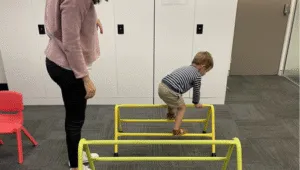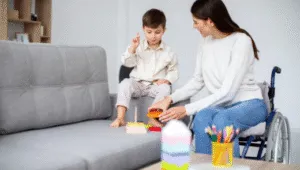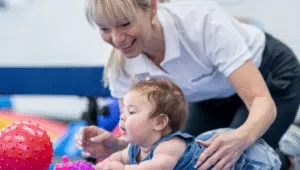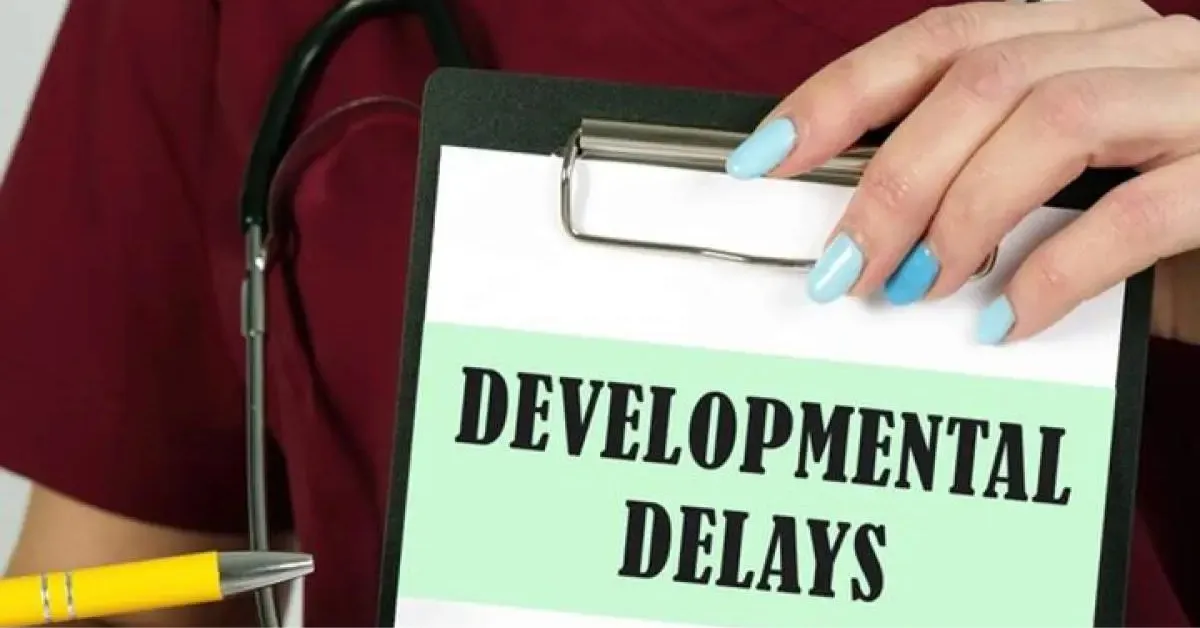Developmental delay occupational therapy, when parents first notice their child isn’t reaching expected milestones, it can be both concerning and overwhelming. Many children show signs of developmental delays during their early years, particularly in the first five years when predictable growth patterns occur. Pediatricians are usually the first people parents speak to about these concerns, and it’s important to address them as soon as possible. What might initially appear as simple clumsiness or stubbornness could be signs that a child would benefit from occupational therapy (OT) to help them develop essential skills for daily living.
Developmental delay. Occupational therapy helps kids who are delayed in motor, cognitive, or behavioral development by addressing their specific needs through targeted activities. When a pediatrician deems it necessary to refer a child for intervention, the OT will investigate various conditions that might be affecting the child’s ability to become independent in functional tasks.
These activities of daily living include:
- Feeding themselves
- Toileting
- Dressing
- Maintaining balance and coordination
- Developing handwriting skills for educational needs
The goal is to help children learn to care for themselves while attending to their physical and cognitive development. Early intervention is crucial because babies and young children learn most effectively during these formative years when their brains are fairly adaptable.
Pediatric OT aids children in developing the potential they need for functional living, whether they’re treating:
- Delays are termed as mild
- More significant developmental delay conditions
There are many reasons why developmental delay occupational therapy occurs, and while these reasons should be fully investigated, the proper approach focuses on helping each child reach their maximum independence. Through consistent therapy and care, children can develop the skills necessary for a more independent life, giving parents hope that one day their child will achieve greater functional abilities.

What Does Developmental Delays Mean
Developmental delays in occupational therapy can occur when a child is struggling to meet age-appropriate milestones that usually happen during the first five years of life. Many children experience challenges in one or more areas of development, including motor function, speech and language, or social and cognitive skills. What makes this fairly predictable process concerning is when babies and young children are not reaching these important benchmarks that are known to develop naturally. Developmental delays in milestones serve as markers that help parents and professionals understand if a child is progressing as expected. When developmental delay occupational therapy, it’s termed a condition that requires careful attention and often professional intervention. A child could benefit from occupational therapy when these delays are identified. Children who are struggling may need their situation to be fully investigated to understand the underlying reasons for their challenges. These delays can affect how a child will learn and function in life, making it crucial to identify them early. The experience of reaching milestones should be a natural process, but some children require additional support to develop the skills they need to thrive in their daily activities and social interactions.
Key Warning Signs Parents Should Watch For
Developmental delay occupational therapy early can make a significant difference in a child’s progress, yet many signs often go unnoticed until kids reach school-aged years. When parents have concerns about their child experiencing slower development, it’s important to speak with a pediatrician as soon as possible. Understanding these warning signs helps identify when a professional evaluation might be needed to address delays that can affect a child’s overall growth and learning.
Signs to watch for include:
- Delayed motor development – trouble with rolling, sitting, crawling, or walking at an appropriate age compared to other kids in their age range
- Difficulty communicating – challenges with talking, mutism, or inability to express things they want to communicate
- Cognitive issues – trouble understanding cause and effect relationships between actions and consequences
- Memory and following directions problems – difficulty remembering things or being unable to follow simple instructions
- Below-average IQ test scores that indicate cognitive delays
- Socialization challenges – issues with school interactions and social activities
- Inability to problem-solve age-appropriate tasks or situations
- Unable to perform basic activities like toileting and feeding themselves independently
Developmental delay occupational therapy can present during infancy or remain unnoticed until school-aged years when academic and social demands increase. The range of signs varies greatly, and it’s possible for children to show delays in one or multiple areas of development, making early identification and intervention crucial for helping each child reach their potential.
Understanding Developmental Delays: Occupational Therapy through Milestones
Understanding developmental delays, occupational therapy, and milestones is crucial for identifying when a child may need occupational therapy support. As an OT practitioner, I’ve observed that every child develops at different rates, and recognizing typical achievement patterns helps distinguish between normal variation and delay. These guidelines provide examples of what to expect during practice assessments, though it’s important to know that milestones serve as benchmarks rather than rigid expectations across various ages.
Early Motor and Social Development (3-4 Months)
During my years working with infants, I’ve noticed that by 3 to 4 months, your child should be starting to demonstrate several key skills. Motor development becomes evident as babies begin to grasp objects when placed on a firm surface, push down with their legs when their feet touch solid ground, and hold their head steady with good support.
Personal and social skills emerge as they smile at familiar faces, pay attention to people, and respond to loud sounds or noises. Communication skills also flourish as infants reach for objects, bring their hands to their mouths, babble well, and imitate new sounds they hear around them.
Expanding Abilities (7 Months)
By 7 months, your child should be starting to show more complex abilities across multiple domains. Motor skills advance significantly as babies can sit without assistance, roll over in either direction, bear weight on their legs when standing, and pull themselves up with help. Social skills become more sophisticated as they enjoy games like peek-a-boo, show affection through cuddles, laugh and squeal with enjoyment, and sleep through the night.
Personal skills develop as they take an interest in objects around them, can be comforted by parents, respond when their name is called, and use one hand to reach for items. Communication skills expand as they make various sounds and smile when interacting with familiar people.
Complex Milestone Integration (1 Year)
At 1 year, your child should be starting to integrate more complex skills across developmental delay occupational therapy domains. Motor skills include crawling, standing with support, reaching for objects while maintaining balance, and beginning to search for hidden items. Social skills become more intentional as children show pointing gestures, engage in back-and-forth interactions, use body language effectively, and watch facial expressions for cues.
Personal skills advance through sharing smiles, demonstrating thinking skills by looking at pictures, and waving goodbye appropriately. Communication skills flourish as they use single words like “mama,” make various sounds, crawl toward interesting objects, drag themselves to different locations, and point at things they want while maintaining eye contact.
Advanced Development and Intervention (2 Years)
By 2 years, your child should be starting to master more complex skills, and this is often when developmental delay occupational therapy become more apparent. Motor skills include walking independently, using a spoon effectively, pushing wheeled toys, turning pages in books, and beginning heel-to-toe walking patterns. Communication skills advance to speak at least 15 words, use two-word phrases, follow simple instructions, imitate actions they observe, and communicate basic needs. When children face difficulties with these milestones, occupational therapists can help develop skills more effectively.
Common developmental delay occupational therapy associated with this age often requires immediate functional intervention. Through useful strategies, therapists learn to overcome specific challenges by working with children on pattern recognition, speech development, and motor planning. We know that early intervention helps children reach their potential more successfully than waiting, which is why therapists specifically target areas where children find challenges – whether it’s using a hairbrush, talking on a toy telephone, or understanding how objects function in their bottom drawer or immediate environment.
How Occupational Therapists Transform Lives
- Therapists helps children who may be affected by developmental delay occupational therapythrough specialized intervention strategies that create meaningful change in daily living activities
- Families collaborate with professionals to establish measurable goals that allow them to evaluate progress while treating specific areas where your child needs support
- In my experience, some children attend sessions that focus on fine motor and gross motor skills, which increases their ability to meet milestones faster than children without structured support
- Here are ways that intervention assists families: improves feeding techniques, helps with toileting and hygiene routine, and provides continuity of care through home program implementation
- Socialization skills development, like classroom readiness, creates opportunities for children to be successful in academic environments, while chores and activities of daily living become more manageable
- Familial involvement also has a significant impact on treatment efficacy, as they can learn strategies that meettheir child’s specific developmental delays needs.

Understanding Root Factors Behind Developmental Delays Challenges
- Developmental delay occupational therapy rarely has one singular cause, and through my clinical experience, I’ve observed that contributing factors always occur at different stages – before, during, or after birth – making each case unique
- Genetic conditions such as Down syndrome, metabolic disorders, and various infections represent common causes that are sometimes identified through comprehensive medical evaluations
- Prenatal exposure to harmful substances creates significant risk factors: alcohol, drugs, environmental toxin poisoning, such as lead, and poor maternal health can all impact fetal development
- Birth-related complications include premature delivery, lack of oxygen during delivery, and traumatic injuries that may affect brain development in ways that become apparent later
- Physical trauma, like shaken baby syndrome, severe abuse, neglect, and other traumatic experiences, creates conditions where normal development becomes disrupted
- Sensory impairments, such as poor eyesight or hearing problems, are important contributing factors that sometimes go undetected until developmental delays become more obvious
- What’s important to understand is that causes can be identified in some cases, but not always – regardless, children with delays should be treated appropriately, and determined interventions should begin early for optimal outcomes.

In Summary
Developmental delay occupational therapy in children requires early intervention through occupational therapy to help them reach their full potential and achieve essential milestones. Skilled therapists work with families to establish appropriate treatment programs that focus on improving daily living skills and overall development. When parents collaborate with OT therapists, children benefit from continuity of care between therapy sessions and home activities, making significant progress faster.
Professional assessment and intervention can identify weak areas and create measurable goals that aid in skill building, ultimately helping children learn to function independently. Remember that every child develops at different rates, but with appropriate support and familial involvement, most children can overcome challenges and succeed in their daily routines and classroom activities.
Common Questions
1. What does developmental delay occupational therapy mean?
Developmental delay occupational therapy can occur when a child is struggling to meet age-appropriate milestones that usually happen during the first five years of life. When development becomes delayed, it’s termed a condition that requires careful attention and often professional intervention.
2- What are the key warning signs parents should watch for?
Signs to watch for include delayed motor development, difficulty communicating, cognitive issues, memory and following directions problems, below-average IQ test scores, socialization challenges, inability to problem-solve age-appropriate tasks, and unable to perform basic activities like toileting and feeding themselves independently.
3. How do occupational therapists transform lives?
Occupational therapy helps kids who are delayed in motor, cognitive, or behavioral development by addressing their specific needs through targeted activities. These activities of daily living include feeding themselves, toileting, dressing, maintaining balance and coordination, and developing handwriting skills for educational needs.
4. Why is early intervention crucial?
Early intervention is crucial because babies and young children learn most effectively during these formative years when their brains are fairly adaptable. We know that early intervention helps children reach their potential more successfully than waiting.
5. What are the common causes of developmental delay in occupational therapy?
Genetic conditions such as Down syndrome, prenatal exposure to harmful substances like alcohol and drugs, birth-related complications, including premature delivery and lack of oxygen, physical trauma like shaken baby syndrome, and sensory impairments such as poor eyesight or hearing problems are important contributing factors.

